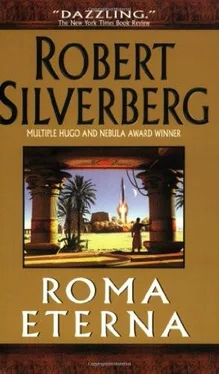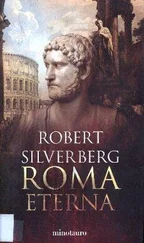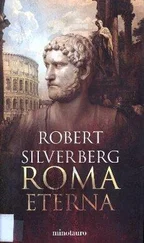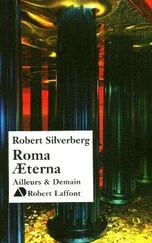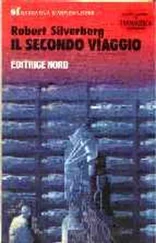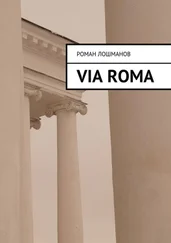Robert Silverberg - Via Roma
Здесь есть возможность читать онлайн «Robert Silverberg - Via Roma» весь текст электронной книги совершенно бесплатно (целиком полную версию без сокращений). В некоторых случаях можно слушать аудио, скачать через торрент в формате fb2 и присутствует краткое содержание. Год выпуска: 2003, ISBN: 2003, Издательство: HarperCollins, Жанр: Альтернативная история, на английском языке. Описание произведения, (предисловие) а так же отзывы посетителей доступны на портале библиотеки ЛибКат.
- Название:Via Roma
- Автор:
- Издательство:HarperCollins
- Жанр:
- Год:2003
- ISBN:978-0-380-97859-5
- Рейтинг книги:4 / 5. Голосов: 1
-
Избранное:Добавить в избранное
- Отзывы:
-
Ваша оценка:
- 80
- 1
- 2
- 3
- 4
- 5
Via Roma: краткое содержание, описание и аннотация
Предлагаем к чтению аннотацию, описание, краткое содержание или предисловие (зависит от того, что написал сам автор книги «Via Roma»). Если вы не нашли необходимую информацию о книге — напишите в комментариях, мы постараемся отыскать её.
Via Roma — читать онлайн бесплатно полную книгу (весь текст) целиком
Ниже представлен текст книги, разбитый по страницам. Система сохранения места последней прочитанной страницы, позволяет с удобством читать онлайн бесплатно книгу «Via Roma», без необходимости каждый раз заново искать на чём Вы остановились. Поставьте закладку, и сможете в любой момент перейти на страницу, на которой закончили чтение.
Интервал:
Закладка:
He is there to greet me as I step down from the carriage. “I am Marcello Domiziano,” he tells me, speaking Roman, grinning broadly as he puts out his hand. “Welcome to my house, dear friend Cymbelin!”
Marcello Domiziano. He uses the Roman, not the Latin, form of his name. In the provinces, of course, we pretentiously allow ourselves Latin names, mingling them to some degree with Britannic or Gallic or Teutonic localisms; but here in Italia the only people who have the privilege of going by names in the ancient Latin mode are members of the Senatorial and Imperial families and high military officers, and the rest must employ the modern Roman form. Frontinus rises above his own privilege of rank: I may call him Marcello, the way I would one of his field hands. And he will call me Cymbelin. Very swiftly we are dear friends, or so he wants me to feel, and I have barely arrived.
The gathering is under way already, on a breeze-swept open patio with a terrazzo floor, looking outward toward the city center far below. Fifteen, perhaps twenty people, handsome men, stunning women, everyone laughing and chattering like the people in the sidewalk cafés.
“My daughter, Adriana,” Frontinus says. “Her friend Lucilla, visiting from Roma.”
They are extraordinarily beautiful. The two of them surround me and I am dazzled. I remember once in Gallia, at a great villa somewhere near Nemausus, I was led by my host into the heart of a mirror maze that he had had built for his amusement, and instantly I felt myself toppling dizzily forward, vanishing between the infinitely reduplicated images, and had to pull myself back with an effort, heart pounding, head spinning.
It is like that now, standing between these two girls. Their beauty dazes me, their perfume intoxicates me. Frontinus has moved away, leaving me unsure of which is the daughter and which is the friend; I look from one to the other, confused.
The girl to my left is full-bodied and robust, with sharp features, pale skin, and flaming red hair arrayed close to her skull in tight coils, an antique style that might have been copied from some ancient wall painting. The other, taller, is dark and slender, almost frail, with heavy rows of blue faience beads about her throat and shadowy rings painted beneath her eyes. For all her flimsiness she is very sleek, soft-skinned, with a glossy Aegyptian look about her. The red-haired one must be Frontinus’s daughter, I decide, comparing her sturdy deep-chested frame to his; but no, no, she is the visitor from Roma, for the taller, darker one says, speaking not Roman but Latin, and in a voice smooth as Greek honey, “You do honor to our house, distinguished sir. My father says that you are of royal birth.”
I wonder if I am being mocked. But I see the way she is measuring me with her eyes, running over my length and breadth as though I am a statue in some museum’s hall of kings. The other one is doing the same.
“I carry a royal name, at any rate,” I say. “Cymbelin—you may know him as Cunobelinus, in the history books. Whose son was the warrior king Caratacus, captured and pardoned by the first Emperor Claudius. My father has gone to great pains to have our genealogy traced to their line.”
I smile disarmingly; and I see that they take my meaning precisely. I am describing the foolish pretensions of a rich provincial merchant, nothing more.
“How long ago was that, actually?” asks the redhead, Lucilla.
“The genealogical study?”
“The capturing and pardoning of your great ancestor.”
“Why—” I hesitate. Haven’t I just said that it was in the time of Claudius the First? But she flutters her eyes at me as though she is innocent of any historical information. “About eighteen centuries ago,” I tell her. “When the Empire was still new. Claudius the First was the fourth of the Caesars. The fifth, if you count Julius Caesar as an Emperor. Which I think is the proper thing to do.”
“How precise you are about such things,” Adriana Frontina says, laughing.
“About historical matters, yes. About very little else, I’m afraid.”
“Will you be traveling widely in Italia?” asks Lucilla.
“I’ll want to see the area around Neapolis, of course. Pompeii and the other old ruins, and a few days on the isle of Capreae. Then up to Roma, certainly, and maybe farther north—Etruria, Venetia, even as far up as Mediolanum. Actually, I want to see it all.”
“Perhaps we can tour it together,” Lucilla says. Just like that, bluntly, baldly. And now there is no flutter of innocence whatever in her wide-set, intelligent eyes, only a look of unmistakable mischief.
Of course I have heard that the women of Roma are that way. I am startled, all the same, by her forwardness, and for the moment I can find no reply; and then all the others come flocking around me. Marcellus Frontinus bombards me with introductions, reciting name after name, spilling them forth so quickly that it’s impossible for me to match name to face.
“Enrico Giunio, the Count of Pausylipon, and Countess Emilia. My son, Druso Tiberio, and his friend Ezio. Quintillo Fabio Puteolano. Vitellio di Portofino; his wife, Claudia; their daughter, Crispina. Traiano Gordiano Tertullo, of Capreae—Marco Ulpio Africano—Sabina Metella Arboria—” A blur of names. There is no end to them. One alone out of all of them registers with real impact on me: “My brother, Cassio,” Frontinus says. A slender, olive-skinned man with eyes like bits of polished coal: the great war hero, this is, Cassius Lucius Frontinus! I begin to salute him, but Frontinus rattles out four more introductions before I can. People seem to be materializing out of thin air. To Adriana I whisper, “Has your father invited all of Neapolis here tonight?”
“Only the interesting ones,” she says. “It isn’t every day that a British king visits us.” And giggles.
Swarms of servants—slaves?—move among us, bringing things to eat and drink. I am cautious in the first few rounds, reminding myself that this is only my first day here and that the fatigue of my journey may lead me into embarrassments, but then, to avoid seeming impolite, I select a goblet of wine and a small meat-cake, and hold them without tasting them, occasionally lifting them to my mouth and lowering them again untouched.
The high lords and ladies of Neapolitan society surround me in swirling clusters, peppering me with questions to which they don’t really appear to be expecting answers. Some speak in Roman, some in Latin. How long will I be here? Will I spend my entire time in Neapolis? What has aroused my interest in visiting Italia? Is the economy of Britannia currently flourishing? Does everyone speak only Britannic there, or is Latin widely used also? Is there anything in Britannia that a traveler from Italia would find rewarding to see? How does British food compare with Italian food? Do I think that the current Treaty of Unity will hold? Have I been to Pompeii yet? To the Greek temples at Paestum? On and on. It is a bombardment. I make such replies as I can, but the questions overlap my answers in a highly exhausting way. I am grateful for my stout constitution. Even so, after a time I become so weary that I begin to have trouble understanding their quick, idiomatic Roman, and I revert entirely to the older, purer Latin tongue, hoping it will encourage them to do the same. Some do, some don’t.
Lucilla and Adriana remain close by my side throughout the ordeal, and I am grateful for that also.
These people think of me as a new toy, I realize. The novelty of the hour, to be examined in fascination for a little while and then discarded.
The wind off the bay has turned chilly with the coming of evening, and somehow, almost imperceptibly, the gathering has moved indoors and upstairs, to a huge room overlooking the atrium that will apparently be our banqueting hall.
Читать дальшеИнтервал:
Закладка:
Похожие книги на «Via Roma»
Представляем Вашему вниманию похожие книги на «Via Roma» списком для выбора. Мы отобрали схожую по названию и смыслу литературу в надежде предоставить читателям больше вариантов отыскать новые, интересные, ещё непрочитанные произведения.
Обсуждение, отзывы о книге «Via Roma» и просто собственные мнения читателей. Оставьте ваши комментарии, напишите, что Вы думаете о произведении, его смысле или главных героях. Укажите что конкретно понравилось, а что нет, и почему Вы так считаете.
